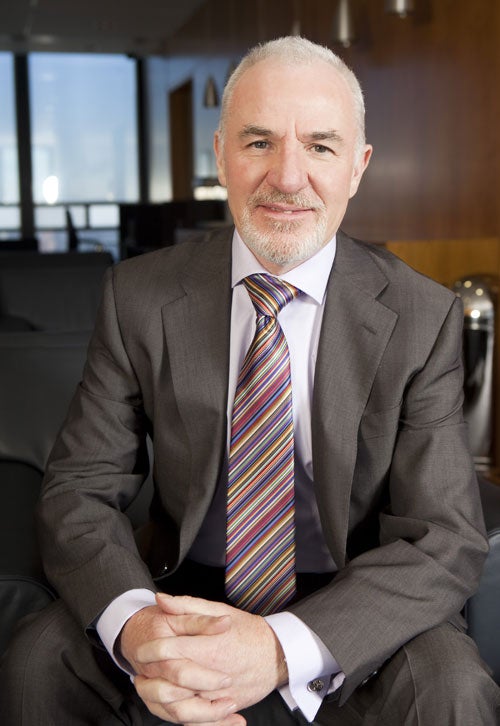Going green: Why it's good for business
Companies realise that the recession is no excuse to ignore the environment

Britain's biggest companies are forging ahead with attempts to make their businesses more sustainable despite the worst recession since the 1930s, new research has found.
The report shows that executives are serious about trying to halt damage wrought on the planet by the world's corporations. It should go some way to allaying consumers' fears that companies' environmental pledges are little more than "green wash".
Despite fears that the UK is poised for a "double dip" recession, nearly half of 500 senior executives questioned for the report said they planned to invest up to 50 per cent more to make their businesses more sustainable over the next decade.
The snapshot of British boardrooms, which surveyed executives at companies with turnovers between £50m and £500m, is a shot in the arm for the environmental movement, which has had a rocky year. It follows a report for the UN in June that showed 93 per cent of the world's top chief executives see sustainability as important to their company's future success.
Green campaigners welcomed the findings in the new report, which show that businesses are forging ahead of the Government when it comes to environmental issues. James Goodman, senior adviser at the environmental think-tank Forum for the Future, said: "We've seen sustainability move from a marginal exercise in PR five to ten years ago into the boardroom. More and more companies now see it as a commercial imperative."
The new research, which will be unveiled tomorrow by the mobile phone operator O2, found that corporate commitment to environmentalism had reached a tipping point because businesses were making money from making themselves green. Nearly 60 per cent of the 500 senior executives questioned said sustainability could increase market share and almost half felt it could boost profits by making their operations more efficient.
The report, written by The Future Laboratory, a consultancy, found there is a new generation of green-minded managers, which suggests that companies' enthusiasm for environmentalism will only grow. One-third of executives aged between 25 and 44 believe improving the sustainability of their organisation is "very critical" to its success, with those aged 45 to 54 seeing it as "critical". Martin Raymond, strategy and insight director at The Future Laboratory, said: "We've seen a stage shift between the old guard in business who see sustainability as something they had to do for shareholders or their public image and the
younger executives who see it as something more important."
Stephen Hine, head of responsible investment development at EIRIS, which assesses companies' green credentials, said that although the recession had prompted some executives to question their eco agenda, "those who are thinking long term realise there is a strong business case for, say, using less energy or water, because it saves money and improves their brand image". He added: "Being green can help companies to gain new clients, or enhance their share price because being able to manage risks better could help to avoid an otherwise damaging controversy."
Mr Raymond, who co-wrote the report, said there was a new era of "eco-nomic [sic] rather than economic theory" which is affecting every business decision down to the supply chain. Nearly three-quarters of executives said they would drop suppliers with a poor record on sustainability, he added. But he warned that companies needed to think imaginatively about environmental issues, otherwise "green fatigue" would set in with consumers. "Sustainability requires surprise; otherwise it risks being dull," he said.
Not everyone thinks that companies have all the answers, however. Heather Rogers, whose Green Gone Wrong was published in the UK last month, said that companies trying to do the "right thing [regarding the environment] were the exception". She added: "We need to scale back consumption."
Additional reporting by Emily Braham
Good Energy
CEO Juliet Davenport
"Forward-thinking businesses are taking steps now to safeguard their future energy security, by investing in their own renewable generation capacity."
Marks & Spencer
Mike Barry, Head of Sustainable Business
"We have set ourselves the ambitious goal of becoming the world's most sustainable retailer by 2015."
The Co-operative Group
Peter Marks, Group Chief Executive
"Our approach to sustainable development is very much part of 'business as usual'."
Waitrose
Quentin Clark, Head of Sustainability and Ethical Sourcing
"Waitrose created its first ever Head of Sustainability role in June this year reflecting our increased investment in this area"
Kingfisher plc
Ray Barker, Director of Corporate Responsibility
"During the economic downturn, the proportion of eco goods we sold rose from 7 per cent to 10 per cent of total sales, topping £1bn."
Sainsbury's
Neil Sachdev, property director
"Our focus on environment and sustainability has never wavered, in spite of the recession, and it remains at the heart of what we do."
PricewaterhouseCoopers
Malcolm Preston, partner, sustainability and climate change practice leader.
"Climate change policies and regulation in the UK brought green policies into the corporate mainstream, making it an economic issue rather than simply an environmental or social one."
Forster
CEO Jilly Forster
"Our commitment to sustainable living is part of Forster's DNA; it's built-in, not bolt-on."
HSBC
Francis Sullivan, Deputy Head of Group Corporate Sustainability
"It's impossible to predict future shocks and crises, but we believe that our continuing commitment to sustainability will help us to withstand them."
Join our commenting forum
Join thought-provoking conversations, follow other Independent readers and see their replies
Comments
Bookmark popover
Removed from bookmarks